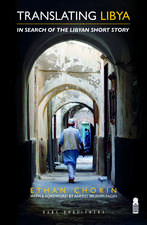Exit the Colonel: The Hidden History of the Libyan Revolution
Autor Ethan Chorinen Limba Engleză Hardback – 22 oct 2012
InExit
the
Colonel,
Ethan
Chorin,
a
longtime
Middle
East
scholar
and
one
of
the
first
American
diplomats
posted
to
Libya
after
the
lifting
of
international
sanctions,
goes
well
beyond
recent
reporting
on
the
Arab
Spring
to
link
the
Libyan
uprising
to
a
flawed
reform
process,
egregious
human
rights
abuses,
regional
disparities,
and
inconsistent
stories
spun
by
Libya
and
the
West
to
justify
the
Gaddafi
regime's
"rehabilitation."
Exit
the
Colonel
is
based
upon
extensive
interviews
with
senior
US,
EU,
and
Libyan
officials,
and
with
rebels
and
loyalists;
a
deep
reading
of
local
and
international
media;
and
significant
on-the-ground
experience
pre-
and
post-revolution.
The book provides rare and often startling glimpses into the strategies and machinations that brought Gaddafi in from the cold, while encouraging ordinary Libyans to "break the barrier of fear." Chorin also assesses the possibilities and perils for Libya going forward, politically and economically.
The book provides rare and often startling glimpses into the strategies and machinations that brought Gaddafi in from the cold, while encouraging ordinary Libyans to "break the barrier of fear." Chorin also assesses the possibilities and perils for Libya going forward, politically and economically.
Preț: 250.79 lei
Nou
Puncte Express: 376
Preț estimativ în valută:
47.99€ • 50.23$ • 39.94£
47.99€ • 50.23$ • 39.94£
Carte disponibilă
Livrare economică 10-24 martie
Preluare comenzi: 021 569.72.76
Specificații
ISBN-13: 9781610391719
ISBN-10: 1610391713
Pagini: 384
Ilustrații: 1 map
Dimensiuni: 165 x 241 x 32 mm
Greutate: 0.61 kg
Editura: PublicAffairs
Colecția PublicAffairs
ISBN-10: 1610391713
Pagini: 384
Ilustrații: 1 map
Dimensiuni: 165 x 241 x 32 mm
Greutate: 0.61 kg
Editura: PublicAffairs
Colecția PublicAffairs
Notă biografică
Ethan
Chorinwas
U.S.
economic/commercial
attaché
in
Tripoli
from
2004-2006.
He
has
continued
to
work
on
Libyan
issues
as
business
developer
for
a
multinational
company
based
in
Dubai
and
as
cofounder
of
the
Avicenna
Group,
an
NGO
helping
to
build
a
trauma
center
in
Benghazi.
The
author
ofTranslating
Libya:
The
Modern
Libyan
Short
Story,
he
is
currently
a
Social
Enterprise
Fellow
at
the
Yale
School
of
Management.
He
lives
in
Berkeley,
California.
Recenzii
Retired
Ambassador
Joseph
Wilson,
author
of
The
Politics
of
Truth
“Ethan Chorin brings a unique perspective to his riveting tale of the rise and fall of Muammar Gaddafi:Exit the Colonel. Having served as a diplomat in Tripoli at the time of Gaddafi rapprochement with the West, Chorin tells the story of how the West wound up allied to the ‘mad dog of the Middle East' and facilitated Gaddafi's rehabilitation, which was key to his fall. This is an exquisite and scary story of greed, intrigue, and political corruption at the highest levels of several nations, including the US and the UK. For anybody interested in international relations, or for anybody whose paths, like mine, crossed Gaddafi's several times, this is a must-read."
The National“What caused such radical policy changes in the region? This is the intriguing question the Middle East scholar Ethan Chorin tackles in his detail-rich book Exit the Colonel.”
Libya Index “A concise analysis of past, present and future effects of Gaddafi's regime.”
Shepherd Express(Milwaukee)“Chorin offers a plausible portrait of the capricious, violent ruler who improved the lives of his people before veering on an unstable course of brutal repression, insane economics and global provocation.”
Boston Globe
“The best recent book, I think, to go beyond the cult of personality to the traumatized but brave Libyans themselves… He met many countrymen, learned much, and all this adds grit and gravitas to his later ‘Exit the Colonel.' I felt especially enlightened, for instance, by his coverage of the country's east-west split.”
Journal of North African Studies“Organised chronologically, Chorin combines diplomatic memoir, political history and shrewd analysis to offer what is arguably the most detailed account to date of the regime's final years… Chorin's account is highly informative, his observations are sensible, and his diplomatic experiences are fascinating. ..This book sheds unveils the workings of the regime during its final years, and reveals its internal tensions and power struggles (particularly among his sons), reforms and brutalities, and western sycophancy in equal measure. Even for Libya specialists, it is highly informative and provides what is thus far the definitive account of the West's reconciliation with and re-alienation from the regime and provides immediate context to its downfall.”
Montreal Gazette
“Exit the Colonel: The Hidden History of the Libyan Revolution is a timely, if rushed, affair…For me, it is Gadhafi's erstwhile rehabilitation that is the most intriguing part of the book.”
Middle East
“This book demonstrates how Gaddafi was soon to reap the whirlwind, as his feints toward reform actually engendered a revolutionary movement that proved all too real and powerful to be put down. Ethan Chorin provides a look into the near and long-term roots of the Libyan uprising and explains why the revolution happened as it did before exploring the longer-term consequences for Libya and the West.”
International Affairs“The information taken from personal interviews with key Libyan and non-Libyan players occasionally provides new insight and fresh perspective to policies and events in this period… Chorin provides the most authoritative and detailed analysis of the February 17 Revolution published to date.”
Sugar Street Review“Chorin had plenty of first-hand insights into the workings of the previous regime, and gives a highly readable and accurate account of what lead Libyans to rise up in February 2011. Crucially, Chorin is also an aficionado of Libyan literature, and he illustrates his account with excerpts from the country's finest writers.”
“Ethan Chorin brings a unique perspective to his riveting tale of the rise and fall of Muammar Gaddafi:Exit the Colonel. Having served as a diplomat in Tripoli at the time of Gaddafi rapprochement with the West, Chorin tells the story of how the West wound up allied to the ‘mad dog of the Middle East' and facilitated Gaddafi's rehabilitation, which was key to his fall. This is an exquisite and scary story of greed, intrigue, and political corruption at the highest levels of several nations, including the US and the UK. For anybody interested in international relations, or for anybody whose paths, like mine, crossed Gaddafi's several times, this is a must-read."
The National“What caused such radical policy changes in the region? This is the intriguing question the Middle East scholar Ethan Chorin tackles in his detail-rich book Exit the Colonel.”
Libya Index “A concise analysis of past, present and future effects of Gaddafi's regime.”
Shepherd Express(Milwaukee)“Chorin offers a plausible portrait of the capricious, violent ruler who improved the lives of his people before veering on an unstable course of brutal repression, insane economics and global provocation.”
Boston Globe
Dirk
Vandewalle,
professor
of
government
at
Dartmouth
College
and
author
ofA
History
of
Modern
Libya
"Of all the accounts written so far about Libya's revolution, none can match Chorin's sophisticated and penetrating analysis of the country and of its former quixotic ruler. An insider's account, Exit the Colonel details the events leading up to the revolution, and reveals the larger context within which Libya's uprising eventually took shape. Relying on an unmatched variety of sources and on extensive in-country experience, Chorin's book will undoubtedly remain the best analytical work on Libya and its revolution for a very long time."
"Of all the accounts written so far about Libya's revolution, none can match Chorin's sophisticated and penetrating analysis of the country and of its former quixotic ruler. An insider's account, Exit the Colonel details the events leading up to the revolution, and reveals the larger context within which Libya's uprising eventually took shape. Relying on an unmatched variety of sources and on extensive in-country experience, Chorin's book will undoubtedly remain the best analytical work on Libya and its revolution for a very long time."
“The best recent book, I think, to go beyond the cult of personality to the traumatized but brave Libyans themselves… He met many countrymen, learned much, and all this adds grit and gravitas to his later ‘Exit the Colonel.' I felt especially enlightened, for instance, by his coverage of the country's east-west split.”
Journal of North African Studies“Organised chronologically, Chorin combines diplomatic memoir, political history and shrewd analysis to offer what is arguably the most detailed account to date of the regime's final years… Chorin's account is highly informative, his observations are sensible, and his diplomatic experiences are fascinating. ..This book sheds unveils the workings of the regime during its final years, and reveals its internal tensions and power struggles (particularly among his sons), reforms and brutalities, and western sycophancy in equal measure. Even for Libya specialists, it is highly informative and provides what is thus far the definitive account of the West's reconciliation with and re-alienation from the regime and provides immediate context to its downfall.”
Montreal Gazette
“Exit the Colonel: The Hidden History of the Libyan Revolution is a timely, if rushed, affair…For me, it is Gadhafi's erstwhile rehabilitation that is the most intriguing part of the book.”
Middle East
“This book demonstrates how Gaddafi was soon to reap the whirlwind, as his feints toward reform actually engendered a revolutionary movement that proved all too real and powerful to be put down. Ethan Chorin provides a look into the near and long-term roots of the Libyan uprising and explains why the revolution happened as it did before exploring the longer-term consequences for Libya and the West.”
International Affairs“The information taken from personal interviews with key Libyan and non-Libyan players occasionally provides new insight and fresh perspective to policies and events in this period… Chorin provides the most authoritative and detailed analysis of the February 17 Revolution published to date.”
Sugar Street Review“Chorin had plenty of first-hand insights into the workings of the previous regime, and gives a highly readable and accurate account of what lead Libyans to rise up in February 2011. Crucially, Chorin is also an aficionado of Libyan literature, and he illustrates his account with excerpts from the country's finest writers.”














